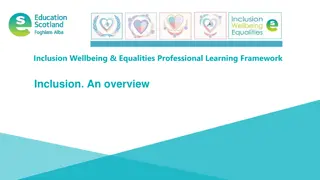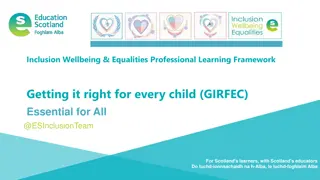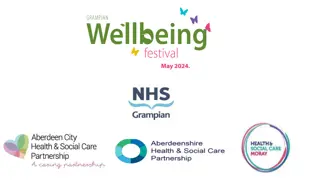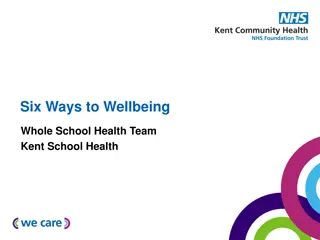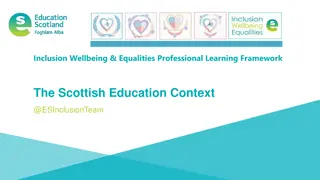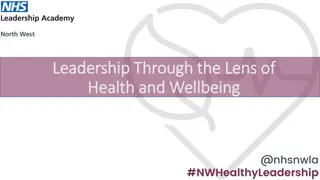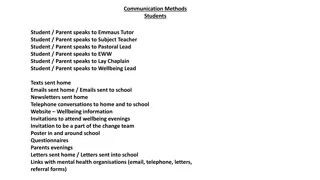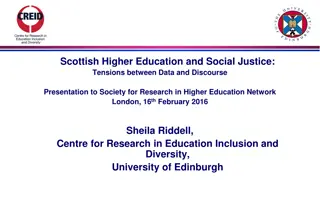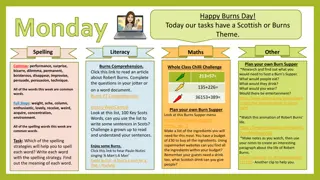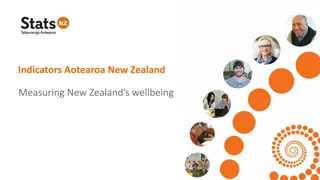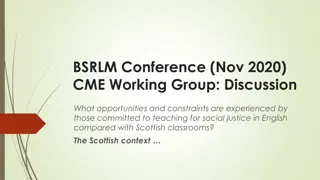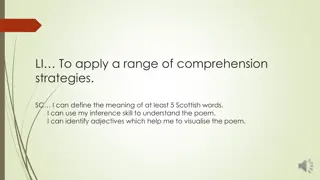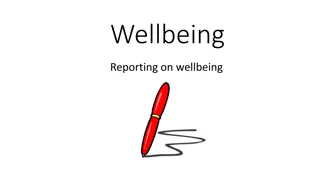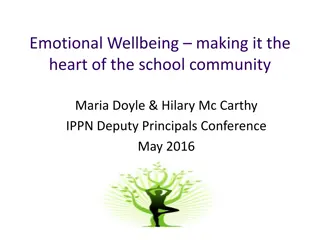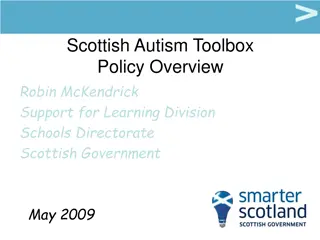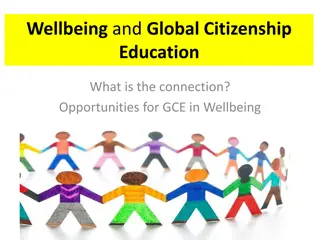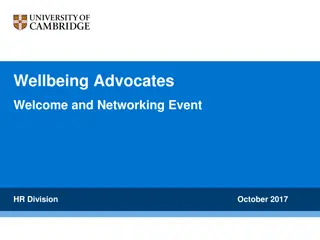Enhancing Wellbeing in Scottish Education: A Comprehensive Overview
The Scottish Government's strong focus on mental health and wellbeing in education is highlighted, emphasizing the importance of a whole-school approach and early intervention. Various resources and tools are provided to support staff wellbeing and enhance the mental health support available for learners in Scotland. The ongoing need for vigilance and support, especially during the current COVID-19 situation, underscores the commitment to promoting wellbeing for both staff and students.
Download Presentation

Please find below an Image/Link to download the presentation.
The content on the website is provided AS IS for your information and personal use only. It may not be sold, licensed, or shared on other websites without obtaining consent from the author. Download presentation by click this link. If you encounter any issues during the download, it is possible that the publisher has removed the file from their server.
E N D
Presentation Transcript
The Cycle of Wellbeing Lorna Aitken Lorna.Aitken@educationscotland.gov.scot @ESInclusionTeam For Scotland's learners, with Scotland's educators Transforming lives through learning Document title
Wellbeing The Scottish Government s Mental Health Strategy published in March 2017 sets out the vision to improve mental health in Scotland. A key section in the strategy deals with prevention and early intervention which outlines the ambition that every child and young person should have appropriate access to emotional and mental wellbeing support in school. The importance of a whole school approach was highlighted in the Schools: personal and social education review, as a key aspect to promote positive mental health for children and young people and to enable the link between mental health services across education and in the wider community. This presentation provides an overview of the current context of wellbeing supports for education practitioners in Scotland. Whole school community Covid-19 Research continues to evidence the importance of staying alert to recognising and supporting the mental wellbeing of our children and young people at this time. It is worth remembering that a whole school approach ensures consistent key messages and themes will support the recovery. For Scotland's learners, with Scotland's educators Document title
The cycle of wellbeing The Cycle of Wellbeing | Learning resources | National Improvement Hub (education.gov.scot) Wellbeing of and for staff Wellbeing supporting whole school approaches Evaluating progress of wellbeing Professional learning to support the wellbeing of children and young people Supporting learning & teaching For Scotland's learners, with Scotland's educators Document title
The cycle of wellbeing Wellbeing of and for staff For Scotland's learners, with Scotland's educators Document title
Wellbeing (of and for staff) This Wellbeing planning tool provides a traffic light warning system that staff can use to recognise if their own wellbeing may be at risk and suggests ways to manage stress. This short video provides a helpful overview Staff Wellbeing & Self Care in a Crisis on Vimeo Support for the education workforce | National Improvement Hub This resource has been developed in collaboration with key partners across the education system. The aim is to ensure that staff across the education system feel supported, and to ensure they are able to meet the needs of our learners across the system during this challenging time. A wide range of free professional learning has been made available for education staff to access. Supporting Workforce Wellbeing (education.gov.scot) In addition, this Sway has been developed by colleagues at NHS Education Scotland to support staff wellbeing. This Wakelet also contains signposts to supports for the 5 ways to wellbeing developed for staff. For Scotland's learners, with Scotland's educators Document title
The cycle of wellbeing Wellbeing supporting whole school approaches For Scotland's learners, with Scotland's educators Document title
Wellbeing (supporting whole school approaches) It is widely recognised that using a whole school approach helps promote positive mental wellbeing. A whole school approach can be preventative, is universal and can include targeted interventions to ensure that the needs of all members of a school community are met. This Whole School Approach to Mental Health and Wellbeing self evaluation framework places the rights of the child at the heart of the whole school community and provides an opportunity to reflect on their own learning needs, through identifying areas of strength and areas requiring structured next steps for improvement. The results from this self evaluation framework could be used to evidence aspects of the School Improvement Planning process. For Scotland's learners, with Scotland's educators Document title
The cycle of wellbeing Professional learning to support the wellbeing of children and young people For Scotland's learners, with Scotland's educators Document title
Wellbeing (professional learning to support the wellbeing of children & young people) In order to ensure staff have the knowledge and skills required to support the wellbeing of children and young people, they must first identify their own professional learning needs in this area. This Children and young people's mental health and wellbeing : a knowledge and skills framework for the Scottish workforce from NHS Education for Scotland contains the knowledge and skills required to support the mental health & wellbeing of children and young people. It can be used as part of an individual s Professional Review and Development (PRD) process to help identify gaps in knowledge and skills at the Informed and Skilled levels. From this, professional learning to meet any gaps in learning can be identified. For Scotland's learners, with Scotland's educators Document title
Wellbeing (professional learning to support the wellbeing of children & young people) This Children and Young People Mental Health Professional Learning Resource is an online professional learning resource which aims to provide school staff with knowledge and understanding of mental health and wellbeing of children and young people in schools. (and links to the previously mentioned NES framework) Further professional learning to support the wellbeing of children and young people includes; Compassionate & Connected Community : Professional Learning Activity (PLA) Glow login required Supporting children and young people through grief and loss : Professional Learning Activity (PLA) Glow login required Roles of middle leadership : Supporting Staff Wellbeing Role : Professional Learning Activity (PLA) Glow login required NES Trauma Informed - National Trauma Training Programme Let s introduce anxiety management (LIAM) in early intervention : LIAM is a staged training offer intended to develop skills in the delivery of a Cognitive Behaviour Therapy (CBT) informed approach for the treatment of mild-moderate anxiety symptoms in children and young people This Wakelet is a collection of links to materials that can be used to support the mental health and wellbeing of children. It includes signposts for practitioners, parents and carers and also direct supports for children and young people to access. For Scotland's learners, with Scotland's educators Document title
The cycle of wellbeing Supporting learning & teaching For Scotland's learners, with Scotland's educators Document title
Wellbeing (children & young people) Supporting learning & teaching Compassionate & Connected Classroom (2nd level) Resilience Alphabet (Early 2nd level) National e-Learning Offer | Education Scotland Digital learning from Comhairle Nan Eilean Siar | e-Sgoil Healthy Relationships - Ten Top Tips - Publications - Public Health Scotland The Journey: Adventures in Resilience (3rd & 4th level) BBC Bitesize HWB activities (Early 4th level) HWB activities (Early 4th level) These Talking Mental Health (primary) & We all Have Mental Health (secondary) animations are universal resources for primary school pupils and have accompanying materials for lessons, assemblies and role play sessions. These are freely available for use in Scottish schools. For Scotland's learners, with Scotland's educators Document title
The cycle of wellbeing Evaluating progress of wellbeing For Scotland's learners, with Scotland's educators Document title
Wellbeing (children & young people) Evaluating progress of wellbeing There is an expectation for all areas of the curriculum that progress will be evidenced through the levels using the Experiences and Outcomes and the Curriculum for Excellence Benchmarks. However, with mental, emotional, social & physical (MESP) the Experiences and Outcomes of fall within Responsibility of All. Here, progress is evaluated on a regular basis as progression is not linear and wellbeing fluctuates from day to day, week to week, month to month and as a result there are no progressive Benchmarks for Responsibility of All. A wide range of tools are available to help evaluate the progress of learners. This helpful Learner Wellbeing Matrix developed by The West Partnership provides a helpful overview of a range of tolls to help evaluate progress in wellbeing, both for identifying universal and targeted needs. Specifically, the Glasgow Motivation and Wellbeing Profile (GWWP) has been used widely and provides and easy to use 20 item questionnaire that explores motivation and wellbeing in a learning context. It can be used to identify next steps for individuals, whole class or whole school interventions and provide opportunities to measure progress of specific interventions over time. For Scotland's learners, with Scotland's educators Document title
Identifying further concerns : Safeguarding our children & young people If consideration of the learner wellbeing needs leads to concern, the principles of the Getting it right for every child approach will guide your practice. The Getting it right for every child (GIRFEC) implementation guide states that practitioners need to ask five key questions: 1. What is getting in the way of this child or young person's wellbeing? 2. Do I have all the information I need to help this child or young person? 3. What can I do now to help this child or young person? 4. What can my agency do to help this child or young person? 5. What additional help, if any, may be needed from others? 6. Is there a Child Protection concern? For Scotland's learners, with Scotland's educators Document title
Immediate risk/child protection concern National Guidance for Child Protection in Scotland 2021 - gov.scot (www.gov.scot) Indicators refer to any new, marked, sudden and/or unexplained change in the presentation, behaviour, appearance or circumstances of the learner that might indicate immediate risk to a child or young person. Some examples of risk indicators are listed below please note that this is not an exhaustive list. mental health issues, including self-harming, or talk around self-harming; inappropriate sexual behaviour; evidence of substance abuse, including alcohol; acute physical, social and/or emotional disturbance or distress; unexpected behaviour such as outbursts or appearing withdrawn; extremes of behaviour which are detrimental to the individual or those around them; inappropriate interactions or exchanges with staff or peers; major social or environment change, or significant family concern; sudden truancy, erratic attendance, or long periods of absence youth offending. Concerns should be formally recorded in line with local authority child protection guidance. For Scotland's learners, with Scotland's educators Document title
Education Scotland Denholm House Almondvale Business Park Almondvale Way Livingston EH54 6GA T +44 (0)131 244 5000 E enquiries@educationscotland.gsi.gov.uk For Scotland's learners, with Scotland's educators For Scotland's learners, with Scotland's educators Document title



